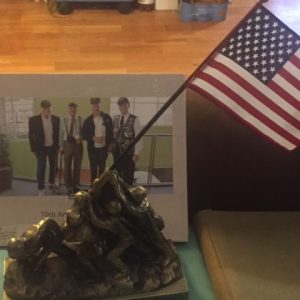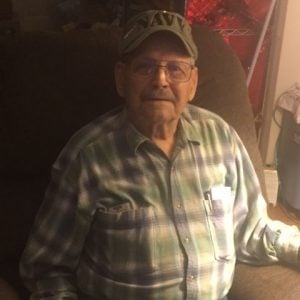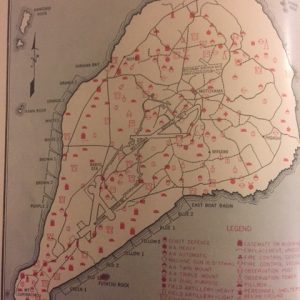By Vicki Prichard
Northern Kentucky Tribune reporter
Seventy years ago, 360 Japanese dive bombers pierced the clouds above Oahu, descending upon the U.S. Naval base at Pearl Harbor. The red symbol of Japan’s Rising Sun upon their wings, the surprise attack left 2,043 Americans dead and 1,178 wounded. Eighteen ships were lost, including five battleships. The surprise attack against the U.S. fleet drew the U.S. into WWII.
Young men, like Northern Kentucky’s Noah Switzer, were among the brave who heard the call to serve.
“I enlisted nine days past my 17th birthday,” says Switzer, who is one of two surviving members of the Fifth Marine Division of the U.S. Navy.
The decision to serve came to him during a school day at Holmes High School.“One day, I was sitting at my desk and I took my books, stacked them, and got up and started toward the door. Mrs. Dwyer, my homeroom teacher, said, “Noah, where do you think you’re going?” and I said, “I’m going to join the Navy.”
Thirty-six days
Switzer went through hospital corps school after boot camp, and in June of 1943 he was transferred to the Portsmouth Naval Hospital. The young medic was later transferred to Camp Pendleton, on the west coast, for parachute training with the Marines. By early 1945, his destination was overseas – to Iwo Jima.
“It was January – my 19th birthday, the 24th of January – and we got there on the 19th of February and we were there until the 26th day of March,” says Switzer.
The need for a base near the Japanese coast prompted the Battle of Iwo Jima Three U.S. Marine divisions landed on the island which was defended by nearly 23,000 Japanese army and navy troops, who fought from an elaborate earthen network of caves, tunnels and underground installations.
“My first casualty was a dead Marine. He was in a crater and I was talking to him and he didn’t even move. So I got a hold of his shoulder and rolled him over, and he was dead. That’s when I got scared, and I guess I stayed scared,” says Switzer.
Switzer recounts the 36 days he spent on Iwo Jima with detail and verve; an energetic storyteller who seems far younger than his 90 years.
“Two guys in my machine gun platoon went out about 50 or 60 yards, threw their machine guns on the ground, and before they got ammunition in them a round of mortar went off right in front of them,” says Switzer. “I got out there and they were laying down. One man, half his head was mangled – no pulse, nothing. The other guy, I gave him a shot of morphine. I don’t know how, but I got him back to where I was and our bugler, who played Reverie and Taps, was in a little concrete ditch and he had a litter [military stretcher], put him on hit and I don’t know what happened to him from there. That’s what it was like from them on for the 36 days I was there.”
During the battle, Switzer lost his hearing for a couple of days when mortars went off close by.
“Somebody hollered, “Hit the deck,” but there was no foxhole or crater, so I just flattened out,” says Switzer.
“Down the ridge, the mortars went on top of two 37 millimeter guns — twelve or thirteen marines were trying to set them up so they could start firing. When I got down there, I had a syringe of morphine in my hand and my medical kits in the other hand. The first guy he was dead; the second one was moaning and I gave him a shot of morphine and got some of his clothes off, patched him up the best I could, and from then on it was just day after day, every day was like that.”
The flag on the mountain
Switzer not only engaged in a battle that for most Americans is recalled through an iconic image, but he witnessed the moment itself on February 23, 1945.
“We were sitting in an area, maybe 100 yards by 50 years wide, just a short distance from the base of Mount Suribachi. I saw both flags go up. They put up a small one, but then they went out to a ship and got a big one and stuck it up, and that’s the one they got the picture of,” says Switzer.
“You should have heard the tootin’ of the horns on the ships, the firing of guns, oh, the noise they made. They thought the battle was over, but it had just begun. There was 32 more days of it, and they were the rough ones.”
The battle continued, and, in spite of arduous conditions, the U.S. emerged victorious.
When the battle was over, Switzer was placed on a ship that, during peacetime, was a passenger liner.
“Boy, they had the table in the mess hall filled with oranges and apples, and orange juice,” says Switzer. “Oh boy, after 36 days of living on K-rations. The first four days I was there I lived on hard candy.”
A lifetime of stories
It’s not surprise that Switzer is a veteran that local historians and media turn to when the calendar turns to anniversaries and celebrations. He is a natural storyteller whose telling of the battlefield is engaging, and puts a local face on a critical time in world history.
On Wednesday, December 7, the 75th anniversary of Pearl Harbor, he will join three local WWII veterans as they share their remarkable stories at 7 p.m. at the Boone County Public Library, 1786 Burlington Pike, in Burlington.
“I get up in front of them and say, “Ladies and gentleman, I could tell you a thousand stories, but I don’t have time,” says Switzer.
But his youthful delivery belies his age, and it seems he may well have decades to keep an audience in rapt attention. His arsenal of stories go beyond the battlefield. His tales of romance, unrequited love, and friendship are told with equal zeal and detail.
Throughout his service, Switzer remained in touch with his girlfriend back home in Covington, and planned to marry her when he returned home.
“I wrote to her for four years,” says Switzer. “I thought the day I got home she’d set a date and in a couple of weeks we’d get married. When Lorraine told me she wasn’t ready to get married, and said she didn’t think she’d marry me, anyway, I said, “Okay, Lorraine, if that’s what you want, that’s what you’ve got.”
Switzer set about his transition to civilian life and found a job with the Goodyear Tire and Rubber Company.
“I was asleep one night and my mother called me. She had went out to Altamont Road to a friend’s house – Alberta Anderson’s.” It must have been 9:30 or 10:00, and she said, “Noah, get your old guitar and come on up here to Alberta’s. “I said, “Mom, I can’t be messing with that old guitar and coming up there, I’ve got to work in the morning.” And she said, “Two pretty little redheads up here.” Well, you should have seen me grab that old guitar and scream the tires on my ’39 Ford ragtop with the rumble seat.”
Susan Jane Brown was 16-years-old when she and Switzer met; he was 21-years-old. The two would later marry.
“We got married under a big oak tree, and it was 90 degrees in the shade. I had a winter suit on; it’s all I had.”

Treasured gifts. A book from the Urology Group chronicles Switzer’s trip to Washington DC, and a commemorative Iwo Jima bronze statue are treasured items.
Two years after the Switzer’s nuptials, a fellow WWIII veteran, Howard Requard, who fought in the Battle of Okinawa, would make Switzer’s former girlfriend Lorraine, his bride. The two were married for 63 years before Lorraine passed away.
Switzer and Sue celebrated 64 years and seven months. Sue passed away on February 24, 2012.
“I really miss her,” says Switzer.
Requard and Switzer remain friends. Last year, the two were joined by two other WWII veterans on a trip sponsored by the northern Kentucky-based Urology Group, for the national recognition of the 70th anniversary of V-E (Victory in Europe) Day on National Mall in Washington, DC.
The Urology Group provided the veterans with a commemorative book which chronicles the trip in photographs.
“I wouldn’t take all the money in the world for that book,” says Switzer.
Like many veterans, Switzer speaks to the camaraderie of service.
“They’re just like family,” he says. “These guys were your buddies, and they were looking out for you. And I was looking out for them.”


























